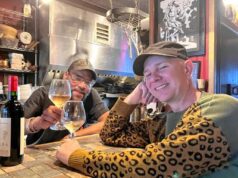

I’ve been thinking about writing to you for a long time. My husband and I are about to celebrate 11 years as a couple and we’ve been married for six. It’s been amazing and so much fun to spend all of this time on planet Earth with such a soul-mate dreamboat of a life partner.
And also: I just keep wanting to hook up with other people.
Five years ago, I hooked up with someone. And then I hooked up with someone else a couple years later. I told him and we went through a harrowing process of separating for a while, talking/crying for a million hours, bringing all of our shadows out of the closet, and reaffirming our commitments. The last several months have been really healthy and strong. And now I have a crush on a woman. This time I told him first and things have been really hard ever since.
We seem to have arrived at a fundamental schism: I feel like the truth of the person I want to be in the world is polyamorous, and his truth is monogamous. How do we reconcile that?
I don’t want to hurt him. But I also don’t want to not live my truth. But then, I’m like, should I just be going to therapy or something so that they can implant in me whatever mechanism he has inside of him to make him fine with monogamy? Ugh.
— Too Late to aPOLYgize
It takes a lot of emotional muscle to do the heavy lifting it sounds like you’ve both done to move through your transgressions and into your new relationship. And that’s exactly what this is: a new relationship.
As Esther Perel talks about in her amazing TEDTalk “Rethinking Infidelity,” after an affair, no matter how long-lasting or fleeting, the old relationship as you know it needs to be deconstructed and rebuilt anew with the raw material you now have in front of you: your self-assuredness in your queer and polyamorous identities; his new understanding of how/if/when to trust you; what he’s willing to forgive, forget, or hold onto; and what you’re willing to put aside or prioritize for yourself.
Relationships don’t thrive because we squash our differences, they thrive because we learn to integrate, tolerate, and celebrate what makes us different from each other. They thrive because we can support one another in our personal growth process while still remaining connected to each other.
This almost flies in the face of what we’ve been told — that relationships are about being more similar than different, and are more about compromise than self-definition. This is especially true for the monogamous ones.
The first step to getting anywhere near a place of seemingly contradictory-yet-connected co-existence is to define yourselves, for yourselves. As Perel waxes so damn poetically — Can you turn the crisis of infidelity into an opportunity?
It seems like this crisis has led you to feeling more self-assured in your desires for others, for polyamory, and for queer experience. But what does your husband want? It’s more likely than not that the pre-affairs status quo of your relationship wasn’t working for him, either. Bask in the rubble of the old relationship, save the treasures, collect what’s important to each of you, and (not without pain, I’m sure) scrap what no longer serves.
Couples therapy is a wonderful place to start this work. The website polyfriendly.org has state-by-state listings of self-described, poly-friendly therapists who are unlikely to push the agenda of “getting one of you to switch over” to either monogamy or non-monogamy. If you can, seek out a therapist who supports difference rather than conformity because as you move ahead, this might be just what you need.
Yana Tallon-Hicks is a pleasure-positive sex writer and educator living in the Pioneer Valley. She has a website bursting with sex advice, resources, and workshops at yanatallonhicks.com.








